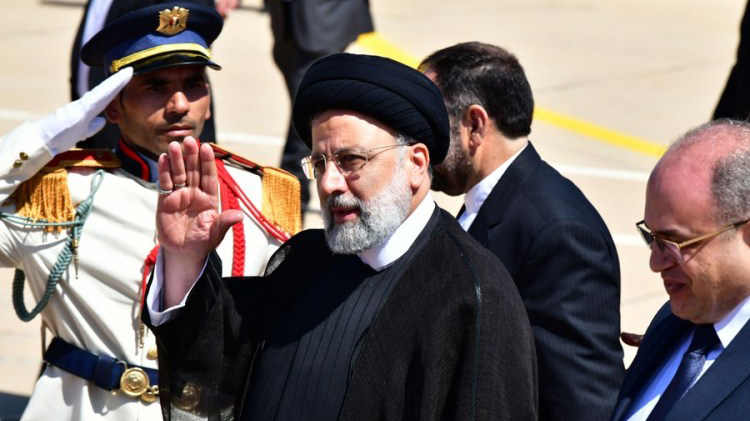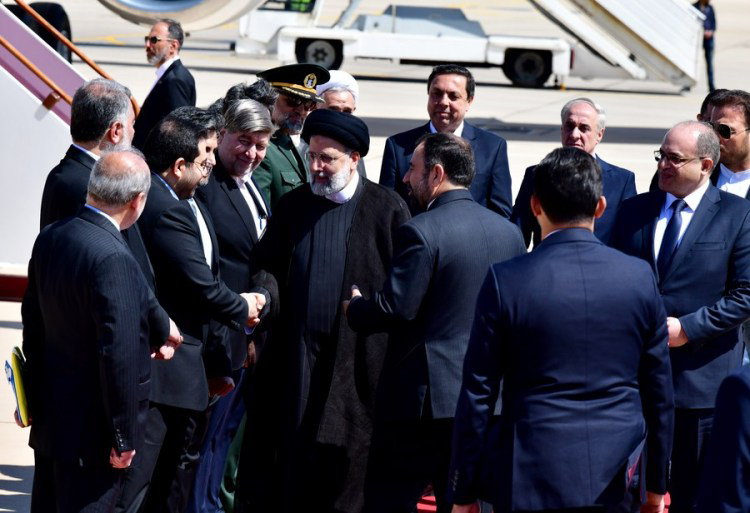
Iranian President Ebrahim Raisi waves upon his arrival at Damascus International Airport in Damascus, Syria, May 3, 2023. /Xinhua
Iranian President Ebrahim Raisi waves upon his arrival at Damascus International Airport in Damascus, Syria, May 3, 2023. /Xinhua
Editor's note: Bobby Naderi is a London-based journalist, guest contributor in print, radio and television, and documentary filmmaker. The article reflects the author's opinions, and not necessarily the views of CGTN.
On May 3, Syrian President Bashar al-Assad and visiting Iranian President Ebrahim Raisi signed memorandums of understanding (MOUs) for "long-term and comprehensive cooperation" in various fields, Syria's state news agency SANA reported.The MOUs cover cooperation in the fields of oil, communications, civil aviation, railways, and agriculture, among others.
This has to be a definitive moment for Syria and a positive change for its people, with enormous ramifications for the Middle East and the world. It follows a decade-long war, the Arab League's decision to re-invite Syria to the regional body, and China's mediating role in the normalization of relations between Iran and Saudi Arabia, which has had positive impacts on the vast geographical area, where the two countries fought proxy wars, including in Syria and Yemen.
Reconstruction blueprints
The Syrian conflict has badly damaged supply chains, restricted incentives for engaging in productive activities, and significantly reduced economic connections. The range of problems and challenges will only grow more complex with ongoing hostilities, which has an impact on the stability of the area. In order to stop additional social unrest, reconstruction help for Syria must be carefully re-evaluated and thoroughly addressed.
Syria's cities, towns, and villages, as well as its vital infrastructure, like water and electrical systems, hospitals, and schools, have all sustained significant damage. To improve the quality of life for millions of Syrians and ensure that they have access to the basic needs of life, those systems must be rebuilt.
Following a period of military de-escalation, Syria's neighbors have expressed a desire to engage in an effective and accountable reconstruction program there. Ironically, the Arab League's decision to open up to Damascus may also influence the course of reconstruction. The regional body can be a key player in arranging investment and offering political assistance in the infrastructure rebuilding of the country.
China, which was instrumental in mediating the rapprochement of Iran and Saudi Arabia, may help with the reconstruction of Syria as well. China has extensive experience in infrastructure investment and economic growth through the Belt and Road Initiative (BRI), and its participation in the restoration of Syria might have a positive impact on both the nation and the surrounding region.

Iranian President Ebrahim Raisi shakes hands with Syrian officials upon his arrival at Damascus International Airport in Damascus, Syria, May 3, 2023. /Xinhua
Iranian President Ebrahim Raisi shakes hands with Syrian officials upon his arrival at Damascus International Airport in Damascus, Syria, May 3, 2023. /Xinhua
The BRI might contribute to enhancing the nation's road, rail, and port systems, which would facilitate the movement of people and products. By facilitating trade and economic activity, this could aid in the creation of jobs and economic expansion. Additionally, the BRI could aid in the construction of pipelines for gas and oil, which would give Syria a reliable source of energy.
It stands to reason that Syria's reconstruction is a massive undertaking that will call for a sizable financial commitment, technical know-how, and political will by the international community. Reconstruction has great potential advantages for both Syria and the rest of the region. Millions of Syrians will live in better conditions, as infrastructure rehabilitation will create much needed employment opportunities, and reverse the brain drain.
Adjusting to a new reality
The argument is one of realism. The impact of U.S.-led sanctions against Syria is being challenged by a growing multilateral movement that seeks to put the country on a better footing without Western funds. Even Washington's closest allies in the region are refusing to follow its problematic lead in hampering economic recovery and leaving Syrians in enduring need. With increased regional stability at the top of the list, they seek to end the crisis and enable a massive reconstruction process.
Such dynamics explain why Damascus has found ways to get around sanctions by importing and exporting items through legal channels, despite Washington's attempts to isolate Damascus and destroy the Syrian economy. The U.S. wants to close these gaps by forbidding efforts to rebuild Syria, but the region's policymakers see this as an impractical solution that will perpetuate the suffering of Syrian people while diminishing the hope of returning for those abroad.
In all instances, Washington's strategy is not thought to be sustainable. Their point of view is that it is simply impossible, as Damascus has established business partners to survive the economic war and shape its post-conflict trajectory. Divisions aside, ensuring a sustainable reconstruction for all Syrians and a safe return for refugees presents an opportunity to correct pre-war inequities for reconciliation too, although any such process will be lengthy.
As more nations, including Arab allies, pursue an independent foreign policy and reject Washington's misguided, doomed-to-fail strategy of leaving the Syrian recovery indefinitely postponed while perpetuating current instability, it is becoming clearer that the interests of all parties today is to break the stalemate in the conflict and rebuild what the horrific war has destroyed.
To escape the conundrum, the political class in Washington will need to adjust to a new reality where major countries have decided to play a role in rebuilding Syria's collapsed walls and roofs and promote its territorial integrity and viability. They need to let go of the delusion that using the sanctions card will still result in the regime change that the long-drawn-out conflict failed to bring about.
(If you want to contribute and have specific expertise, please contact us at opinions@cgtn.com. Follow @thouse_opinions on Twitter to discover the latest commentaries in the CGTN Opinion Section.)